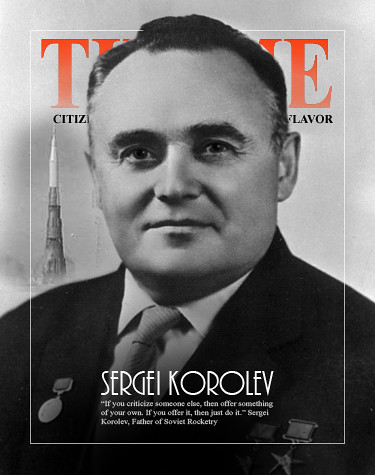
Volume XVIII, Issue III: Sergei Korolev
He Dreamed of Travel in Space
If you criticize someone else, then offer something of your own. If you offer it, then just do it.” –Sergei Korolev, Father of Soviet Rocketry
Sixty-three years ago the first man-made satellite was placed in orbit. The man behind this feat was Ukranian born Sergei Korolev. As a young man he was enthralled with the idea of flight and rose from his initial vocation of builder to become the Soviet Union’s secret ‘Chief Designer.’ Denounced by fellow scientist Valentin Glushko during Stalin’s purges, Korolev was sentenced to hard labor in the Gulag. He was beaten (his jaws were broken) and he almost died there, but was brought back when the Soviets needed to build an ICBM in the days of the Cold War. Ironically, Glushko would design the engines for the great rockets imagined by Korolev. Sergei dreamed of manned flight to the moon and beyond. His dream eventually became the focus of the competition between the two great ideologies when John F. Kennedy proposed a mission to the moon. Many people don’t remember that Kennedy initially went to the United Nations General Assembly where he met Premier Nikita Khrushchev and actually proposed a joint mission by the world’s two superpowers. Though Korolev begged the Soviet leader to accept the offer, Khrushchev had no desire to ‘share the glory’ with the Capitalists. So began the great ‘space race’ of the 1960s.
Korolev, once a prisoner, now became a man so valuable that the KGB insisted his identity be kept a state secret. He was known simply as the ‘Chief Designer.’ He went on to send dogs into space and designed the Vostok Spacecraft that carried Yuri Gagarin into orbit – the first person to fly in space. He began development of the large N1 Rocket and the Soyuz spacecraft in anticipation of a lunar mission but died during surgery to remove a tumor because his injuries from the gulag prevented doctors from saving him. Leonid Brezhnev ordered a full state funeral and his ashes were interred in the Kremlin wall as the world finally learned who the genius behind Russian rocketry really was. Today both Astronauts and Cosmonauts ride together to the International Space Station aboard an N1 Rocket in a Soyuz Spacecraft – essentially as designed by Sergei Korolev!
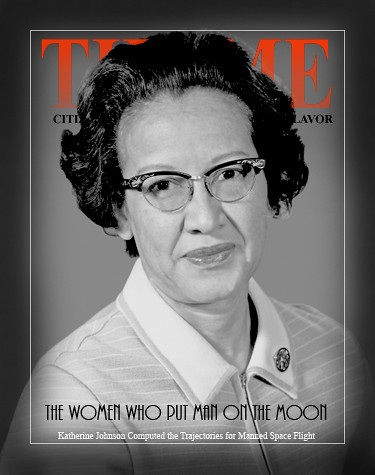
Katherine Johnson calculated the trajectory of American spaceflight.
These Women Put Man on the Moon
Watching those old space shows as a child, it was pretty obvious that you just got into the spacecraft, took off and flew to wherever in the solar system you wanted to go. It looked deceptively simple – and it was! We had no reason to doubt that man had landed on the moon because Buck Rogers had made it look simple. But when President John F. Kennedy gave the imperative to actually put a man on the moon and bring him safely home, it immediately became clear that the problem was not so simple.
In order to go to the moon, you had to take off and steer a course to where the moon would be when you got there. You had to account for parabolic ascent and elliptical orbits. Your travel map existed in the realm of complex geometry and required brilliant mathematicians to chart. Fortunately the NASA Space Task Group at Langley Research Center had just such a group of mathematicians. They were mostly women and quite a few of them were African American! If you have seen the movie Hidden Figures you learned the stories of three of them, but the complex world of spaceflight engineering actually demanded many more. Many of them worked in the West Computing Group at Langley. Here Katherine Johnson and her colleagues mapped the stars for the astronauts. Yes, they literally mapped the heavens, so that the astronauts could navigate by the stars should their machine computers fail them.
This became essential in missions like Apollo 13, where the spacecraft was actually shut down at a time when critical course corrections had to be made. Katherine Johnson was one essential backup person who the navigation controllers in ‘the trench’ at Mission Control called in to calculate the trajectories of the revised mission. This was essential as you had to sling the Command Module and Lunar Module assembly around the moon about 65 miles from the surface. A miscalculation could have sent the spacecraft crashing to the lunar surface or missing the gravitational effect of the moon entirely – hurtling into deep space with no possibility of return.
To me, the complex mapping, verified by many earth orbit tests, is one reason I have little patience for the skeptics who say the lunar landing was somehow ‘faked.’ The careful calculations and critical launch windows only became known because the people who designed the mission really had to do it.
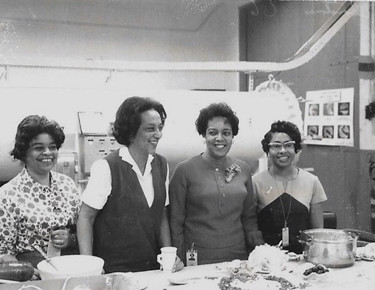
Some of Langley's first computers. NASA Photo.
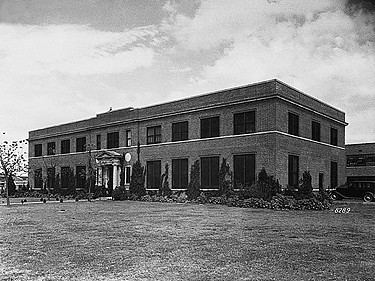
In this 1930's era building, the computers plotted man's path to the moon. NASA Photo.
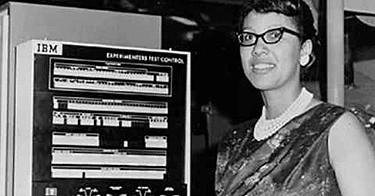
Dorothy Vaughn. NASA Photo.
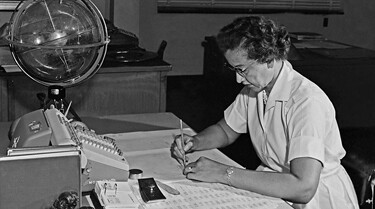
Katherine Johnson. NASA Photo.
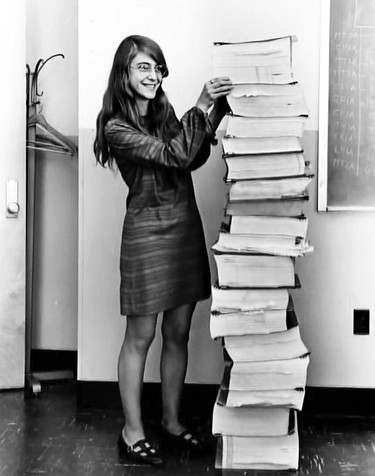
Margaret Hamilton with the printout of the Apollo AGC Software. NASA.
Margaret Hamilton
Software Engineer
Margaret Hamilton was 33 years old when she worked as director of software engineering at the MIT Instrumentation Laboratory. She and her team defined the design and testing criteria for the software that ran the onboard computer on the Lunar Module and developed the concepts of asynchronous flight software and priority scheduling which saved the Apollo computers from crashing during overloads such as the ones that occurred during the Apollo 11 descent to the moon (the 1201 and 1202 alarms).
The Journey of Apollo Eight
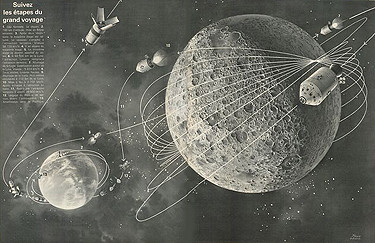
A particularly beautiful diagram of the journey to the moon.
(NASA)
Oleksandr Ignatyevich Shargei
[click to read]
Ukranian Spaceflight Scientist
On June 21, 1897 the world celebrates the birthday of Yuriy Vasilievich Kondratyuk, the famous Ukrainian author of the “route kondratyuka” which the Apollo spacecraft and Lunar Module took to the moon, creating the concept of Lunar Orbit Rendezvous. His real name is Oleksandr Ignatyevich Shargei. He changed it because of the danger posed by the Soviet Union to upper-class Ukranians. This did not prevent him from becoming one of the most famous inventors in the world. (read more)
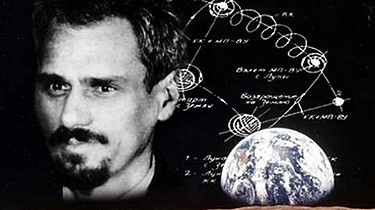
Oleksandr Ignatyevich Shargei plotted the course of Lunar Orbit Rendezvous, which was used to put Apollo astronauts on the moon. NASA's John Cornelius Houbolt and Thomas Dolan of Vought Astronautics referred to Sargei's work as they developed the concept for use by the Apollo program.
Tom Dolan and John Houbolt
Thomas Dolan was an American engineer who proposed the first fully developed concept of Lunar orbit rendezvous for the Apollo program while working at Vought Astronautics. Dolan referred to his LOR study concept as Manned Lunar Landing and Return (MALLAR), and it was largely ignored by NASA administrators until Langley engineer John Houbolt began championing the concept in 1961. The proposed idea outlined a smaller spacecraft dedicated only to operate in the vacuum of space. This spacecraft could act as sort of a shuttle between an orbiting "command module" in Lunar orbit and the surface of the Moon. Following this mission profile required the Command/Service Module and Lunar Module to fly all the way to the moon together and undock while in orbit around the moon, at which point the Lunar Module would land on the moon. In order to return, it would lift off again into lunar orbit and perform an orbital rendezvous with the Command/Service Module. The lander's ascent stage would be left behind in orbit, and the crew would return home using the Command/Service Module. This method saved a lot of weight in propellant and spacecraft mass, but did not gain widespread acceptance early on. The risks associated with Lunar orbit rendezvous were initially considered unacceptable by NASA officials. The Gemini missions would later prove that rendezvous and docking was indeed possible in space, paving the way for Dolan's idea to be put into practice. John Cornelius Houbolt was an aerospace engineer credited with leading the team behind the lunar orbit rendezvous (LOR) mission mode, a concept that was used to successfully land humans on the Moon and return them to Earth. This flight path was first endorsed by Wernher von Braun in June 1961 and was chosen for Apollo program in early 1962. The critical decision to use LOR was viewed as vital to ensuring that Man reached the Moon by the end of the decade as proposed by President John F. Kennedy. In the process, LOR saved time and billions of dollars by efficiently using existing rocket technology. (Wikipedia)
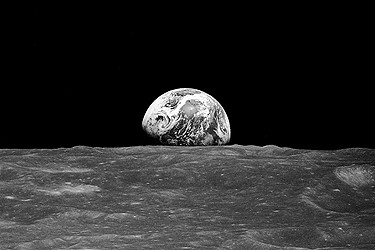
'Earthrise' Photo enhanced by Lunar Reconnaissance Orbiter Imagery. NASA Photo.
Revisiting 'Earthrise'
Lunar Reconnaissance Orbiter
Reading from Genesis
Creating the Lunar Module
The Golden Age of Russian Space Exploration
Christmas Eve 1968:
[click to read]
The Apollo 8 Astronauts and Me
By Brian Scully
On Christmas Eve, 1968, the Apollo 8 astronauts were attempting to do something no human being had ever done before: They were going to try to get my cheapskate father to buy my family our first color television.
Oh yeah, and they were also going to the Moon.
Fifty years ago, on December 21st, 1968, the Apollo 8 astronauts blasted off the Earth from Cape Kennedy and, although they weren’t going to land on the moon, they were going to orbit it and televise it to us all “live” from their space capsule on Christmas Eve. The astronauts, Frank Borman, Jim Lovell and Bill Anders, were risking their lives in this dangerous mission to advance science, to give some good news to a world that desperately needed good news… and to get my dad to buy us a color TV and give me the best Christmas of my life! I add that only so you can see that I also had some skin in the game.
For those of you who weren’t around back then, 1968 was a year of terrible pain in America. The war in Vietnam was spiraling out of control with no end in sight. And just about every family in any big city or small town knew a soldier who had been wounded or died fighting in a country that none of us had ever been to, or knew much about. In 1968 Dr. Martin Luther King and Robert F. Kennedy were fighting for peace, civil rights and an end to violence… and were themselves shot and killed. It was a time when people seemed to stop having friendly conversations with their neighbors across the fence and started angrily hollering at each other in political protests on inner city streets and college campuses.
Just about every morning in 1968 the country woke up to bad news that was worse than the day before. But to a 15 year-old me and my 12 and 7 year-old brothers, the worst news of 1968 was that we still had to watch our favorite TV shows on a crummy black and white television set. Don’t get me wrong, we felt bad about all those other things that were happening in America too. We had seen it all on the TV news, but, just, you know… in black and white. I’m sure we’d have felt much worse if we had seen it in color.
Now, in case you are thinking that color televisions were a pretty rare thing in 1968, well, they were not. Most all of the families in our neighborhood had a color TV. And by 1968, just about every show on all three TV networks was in color. Most other kids could see Adam West’s royal blue cape on “Batman”, Opie’s red hair on “The Andy Griffith Show” and Little Joe Cartwright’s lime green jacket, lavender shirt and tight fawn-beige pants on “Bonanza”. (That might explain why Little Joe got beat up so much by the less tolerant cowboys on the Ponderosa.)
Watching TV in black and white made no sense to my brothers and me. If we went to the local theater, the movies were in color. The pictures that our family’s Kodak Instamatic camera took of us on birthdays, vacations and whenever my youngest brother Neil’s swim trunks fell off, were all in color. Everything my brothers and I saw in our everyday lives was in color. Except for when we got home and turned on our television. And that is because we did not live in “Walt Disney’s Wonderful World of Color”. We lived in Dick Scully’s Crappy World of Black and White.
Dick Scully was my father and he was the only thing standing between me and a color TV. Dad didn’t like spending money on things he considered to be an unnecessary expense… things like name-brand cookies, college educations, and Stingray bikes with monkey handle bars and cool banana seats. And my father considered a color TV the most unnecessary expense of them all. Well, maybe the second-most unnecessary expense after my mother’s visit to the doctor for her annual mammogram.
Every year I spend money that we could be using for other things on that damn test and what does it ever show, Geraldine? Nothing! Every year, absolutely nothing!” He actually made my mother feel guilty for not having cancer. Like if it weren’t for her disappointing mammograms, we’d be eating Oreos instead of Shop-Rite cookies. That was my father.
Every month or so, for years, my brothers and I asked our dad to buy a color TV and every time his answer was the same, if you don’t count swears. “We can’t afford it.” Now, we certainly weren’t rich, but my father made a good living. He had a small dry cleaning store and most of the people in the neighborhood came to him to get the stains out of their clothes. As Dad used to say, “Blood and vomit are our bread and butter.” It would have seemed impossible to make the phrase “Blood and vomit” even more disgusting in a sentence, but my father managed to do it.
My mother also tried to get him to buy a color set for us, but she was more clever and subtle than we were. I remember one time when she said, “Dick, I know you love the kids and they know you love them too. If you say that we can’t afford a color TV, we all believe you. But I was thinking… the boys have also always wanted a cat too and we can get a cat for free, so, if they can’t have a color television, why not let them have a cat instead?” Mom knew our father hated cats, so this was a brilliant plan. If asked, I would have said he hated cats more than he hated spending money on a color television. I would have been wrong. He got us a cat. The irony that it was a black and white cat was not lost on me.
If it sounds like I had the crummiest life of anyone in our neighborhood, well, I didn’t. There was one kid in my school who had it even worse than me… Ralph Forgey. The Forgeys were pretty poor and had a black and white TV like us, but the picture tube had burned out on theirs a few years earlier. They couldn’t see anything on the screen, but the sound still worked, so Ralph Forgey and his family could only listen to TV shows. Maybe that’s why Mrs. Forgey couldn’t understand how some nice girl hadn’t snapped up Liberace yet.
Since it looked like we were never getting a color television, I tried to find ways to watch my favorite shows on other people’s color TVs. My first choice would have been to watch TV over at one of my friends’ houses. The only problem was most of my friends’ parents didn’t like me much, so I was rarely ever invited inside. Some nonsense about things always getting broken whenever I visited. I was considered an “outdoors friend”.
I got so desperate to watch color TV that I came up with a plan that would get me into the house of any kid in my school, even if I never met him. The idea was that I would “find” the kid’s lost jacket and bring it around to his house at about 7:30 that evening, when network TV shows were starting up. Of course, the jacket was never “lost” at all… I had swiped it during the day at school. The plan was that the kid’s parents would be so grateful to me for having found the jacket that I would naturally be invited into their home and would get to watch their color TV with them. Unfortunately, that was never successful because by the time I got to their house, the poor kid had already gotten a beating for losing his jacket and the family was in a bad mood because of the whole thing. On paper though, that one should’ve worked.
Scams like that came to an end when it was announced that the Apollo 8 astronauts were going to the moon and would show it to us all on live television on Christmas Eve. That night at supper, I asked Dad to buy us a color TV again. He had his usual four-word-answer ready… “We can’t afford it.” But I was ready too, because for the first time, I had a good reason for us having a color TV. My brothers and I needed to see the Apollo 8 mission in color for our science classes at school. This time it was for education: The ultimate scam in any kid’s playbook. He replied with a first-ever five-word-answer… “We still can’t afford it.”
Oh man, if the first trip to the moon and education wasn’t enough to get us a color TV, nothing was. I launched into an angry, desperate plea for a color television that both my brothers joined in on. My mom stood next to us in solidarity, however she was holding the cat and I wasn’t sure if that was going to help us or hurt us. “Dick, let’s stop having this same old argument. It’s almost Christmas and this is the perfect time to finally get a color TV. The astronauts are going around the moon for the first time ever and I think our kids should get to see history being made in color like all the other kids in America!” My brothers and I cheered and, to my recollection, the cat meowed.
Dad actually seemed to consider it for a moment. We all held our breaths in anticipation, then he said, “Look, I’d love to have a color TV just like the rest of you but we just can’t afford it…” His voice trailed off as he lit up a cigarette and puffed on it self-satisfied, sure of another victory. But not this time. Mom was ready. “Well, I’ve found a way that we can afford it, “ she said. “I’m going to pay for it myself. I got a job.”
Dad was clearly caught off guard by this new development. “What? A job? Oh come on, Gerri, you can’t be serious… "
Mom told him she was going back to being a waitress, like she was before they were married. My father, not buying any of this, picked up his newspaper and flipped through the pages, snorting, “Sure you are. What restaurant would hire you after all this time?” My mother replied cheerfully, “The Blue Star Tavern” over on Fairview Avenue. I start tomorrow.”
My father leapt up from his chair. “The Blue Star Tavern?! That’s where I eat lunch! I don’t want my wife around when I’m eating lunch!”
You boys can come in during your Christmas vacation and eat for free”, Mom continued. “The job even comes with two uniforms and—“
You get to wear a uniform?” my little brother, Neil, asked, impressed. Mom answered, “Well, they’re not really uniforms… just a nice blouse, a pair of pants and— “
Dad nearly choked! “Pants?!” “Pants!!” he exclaimed a second time to fully register his shock. “No wife of mine is getting a job or wearing pants!”
Panic had set in and my father started begging. “C’mon, Ger’… you can’t do this to me. If you start working, people will think it’s because I don’t make enough money.” Mom countered with, “Well, won’t they think that anyway because we’re just about the only family in the neighborhood that doesn’t have a color television?”
For the first time in his life, my father couldn’t think of something to say. Not even something stupid. Mom just cheerfully continued, “Do you need the car every day, Dick, or do you think we should get another one for me too?” she asked.
Dad angrily snuffed out his cigarette in the ashtray, “I’m putting a stop to this right now!” He reached into his back pocket for his wallet and opened it. If this were a cartoon, the wallet would have had moths flying out of it. Since this was real life, it just smelled bad. He counted out three-hundred dollars in twenties and handed them to my mother, bellowing “Get the damn color TV, but no job… you hear me, girl?!”
I couldn’t believe it… we were actually going to get a color television. I didn’t know what to say. My mom knew what to say, though, as she turned to my dad and gave him a peck on the cheek, “Thanks, honey.”
My father lit another cigarette and fell back into his chair, muttering, “There’s no way Richard F. Scully’s wife is going to be waiting hand and foot on anyone!” He then turned to my mother and barked, “Now go fix me a peanut butter sandwich… and make it snappy!” [read more]
The Urgent Need for a U. S. Space Force
[click to read]
By Steven L. Kwast
In June 2018, President Trump directed the Department of Defense to “begin the process necessary to establish a space force as the sixth branch of the armed forces.” The reason for a space force is simple: space is the strategic high ground from which all future wars will be fought. If we do not master space, our nation will become indefensible. Since that time, entrenched bureaucrats and military leaders across the Department of Defense, especially in the Air Force, have been resisting the President’s directive in every way they can. And this December, although Congress voted to approve a Space Force, it did so while placing restrictions on it—such as that the Space Force be built with existing forces—that will render it largely useless in any future conflicts. At the heart of the problem is a disagreement about the mission of a Space Force. The Department of Defense envisions a Space Force that continues to perform the task that current space assets perform—supporting wars on the surface of the Earth. The Air Force especially is mired in an outmoded industrial-age mindset. It sees the Space Force as projecting power through air, space, and cyberspace, understood in a way that precludes space beyond our geocentric orbit. (read more)
Undoing the Dis-Education of Millennials
[click to read]
By Adam J. MacLeod
I teach in a law school. For several years now my students have been mostly Millennials. Contrary to stereotype, I have found that the vast majority of them want to learn. But true to stereotype, I increasingly find that most of them cannot think, don’t know very much, and are enslaved to their appetites and feelings. Their minds are held hostage in a prison fashioned by elite culture and their undergraduate professors. (read more)
Folly Mills Falls
Photo by Bob Kirchman

Staunton, Virginia's 'Umbrella Building'
Photos by Bob Kirchman
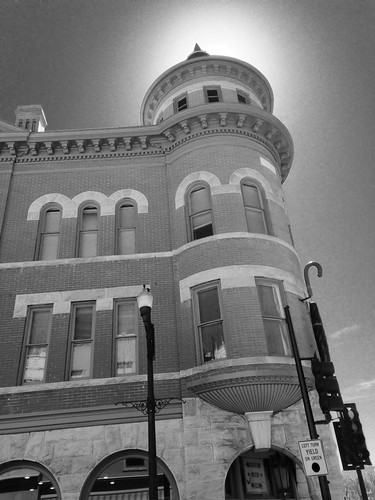
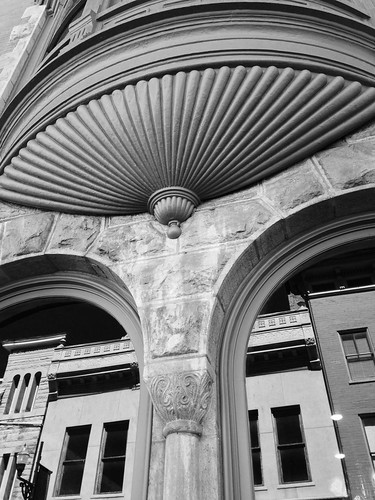
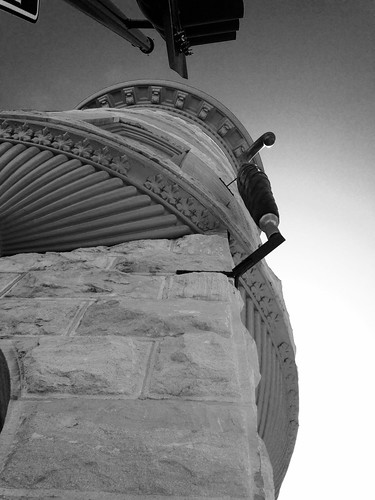
Staunton's Romanesque-Revival Marquis Building, constructed in 1895, originally housed the offices of architect T. J. Collins. Collins is responsible for the design of over 200 buildings in the historic city. A men's clothing shop once occupied the street level and the large umbrella was installed on the facade as a trade sign. Today the building is often referred to as 'The Umbrella Building.' -- Photos by Bob Kirchman
'The Apprentice'
Benjamin Banneker's Amazing Accomplishments
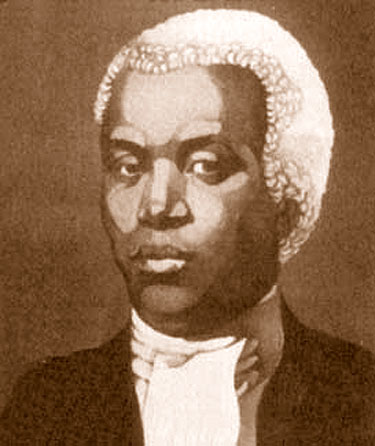
Benjamin Banneker was a renaissance man.
"You're Fired"
A Milestone Monday Feature:
The story of Benjamin Banneker is forever intertwined with the planning of our nation's capital city. In 1791 Banneker was in the employment of Andrew Ellicott, who was charged with the task of laying out the monumental city plan concieved by French architect Pierre Charles de L'Enfant, who had been hired to design a capital suitable for the new republic.
L'Enfant based his design on the best traditions of Baroque landscape design and his creation resembled the hunting gardens of Louis XIV's massive palace at Versailles. L'Enfant proved to be very difficult to work with... America's first 'rock star' architect, you might say. George Washington fired him.
Here the traditional story says that L'Enfant rolled up his drawings and left the young country in a huff, taking his designs with him. Ellicott turned to Banneker, who had prepared the actual surveys, and Banneker is said to have redrawn the plans from memory!
Though many modern historians doubt that Banneker recreated the plans from memory, the man's documented accomplishments would be in keeping with those of a man capable of such a feat.
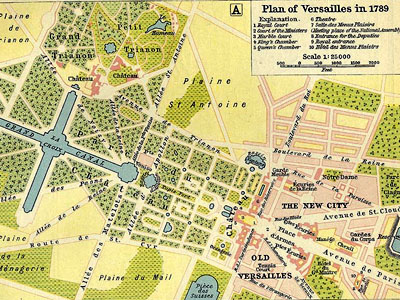
The hunting gardens of Versailles...

...inspiration for our nation's capital?
A simple farmer most of his life, Banneker had the good fortune to know the Quaker settlers of Ellicott's Mills in Maryland. The Society of Friends believed in providing basic education to all people and young Banneker certainly received a solid basic education.
Banneker became a student of astronomy and published an almanac. He corresponded with President Thomas Jefferson on the issue of the status of his fellow African Americans. His letter to Jefferson is well crafted, invoking reason as well as compassion. It appears that Banneker took up the craft of surveying in his fifties, looking to a time when he might be physically too old to farm.
Banneker is said to have observed the workings of a clock and then carved his own working clock mechanism from scrap wood. He published his almanac until 1802.
Banneker lived for four years after his almanacs discontinued. He published a treatise on bees, did a mathematical study on the cycle of the seventeen-year locust, and became a pamphleteer for the anti-slavery movement. He continued scientific studies by night and walked his land by day. He also continued to keep his garden. He hosted many distinguished scientists and artists of his day, and his visitors commented on his intelligence and on his knowledge of everything of importance that was happening in the country. As always, he remained precise and reflective in his conversations with others. His last walk (with a friend) came on October 9, 1806, he complained of being ill and went home to rest on his couch. He died later that day." [1.]
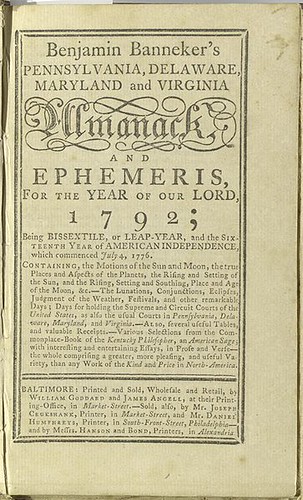
Banneker's Almanac.
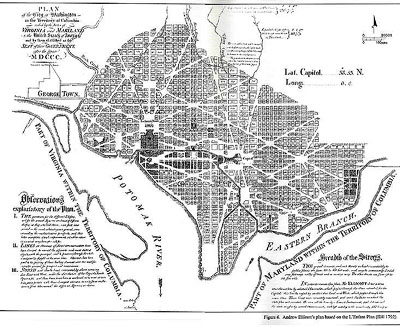
The Ellicott/Banneker map of Washington.

The city today.
1791 Letter to Jefferson
To Thomas Jefferson from Benjamin Banneker,
19 August 1791
From Benjamin Banneker
Maryland. Baltimore County. Near Ellicotts Lower Mills
August 19th: 1791
SIR
I am fully sensible of the greatness of that freedom which I take with you on the present occasion; a liberty which Seemed to me scarcely allowable, when I reflected on that distinguished, and dignifyed station in which you Stand; and the almost general prejudice and prepossession which is so prevailent in the world against those of my complexion. I suppose it is a truth too well attested to you, to need a proof here, that we are a race of Beings who have long laboured under the abuse and censure of the world, that we have long been looked upon with an eye of contempt, and1 that we have long been considered rather as brutish than human, and Scarcely capable of mental endowments.
Sir I hope I may Safely admit, in consequence of that report which hath reached me, that you are a man far less inflexible in Sentiments of this nature, than many others, that you are measurably friendly and well disposed toward us, and that you are willing and ready to Lend your aid and assistance to our relief from those many distresses and numerous calamities to which we are reduced.
Now Sir if this is founded in truth, I apprehend you will readily embrace every opportunity to eradicate that train of absurd and false ideas and oppinions which so generally prevails with respect to us, and that your Sentiments are concurrent with mine, which are that one universal Father hath given being to us all, and that he hath not only made us all of one flesh, but that he hath also without partiality afforded us all the Same Sensations, and endued us all with the same faculties, and that however variable we may be in Society or religion, however diversifyed in Situation or colour, we are all of the Same Family, and Stand in the Same relation to him.
Sir, if these are Sentiments of which you are fully persuaded, I hope you cannot but acknowledge, that it is the indispensible duty of those who maintain for themselves the rights of human nature, and who profess the obligations of Christianity, to extend their power and influence to the relief of every part of the human race, from whatever burthen or oppression they may unjustly labour under, and this I apprehend a full conviction of the truth and obligation of these principles should lead all to. Sir, I have long been convinced, that if your love for your Selves, and for those inesteemable laws which preserve to you the rights of human nature, was founded on Sincerity, you could not but be Solicitous, that every Individual of whatsoever rank or distinction, might with you equally enjoy the blessings thereof, neither could you rest Satisfyed, short of the most active diffusion of your exertions, in order to their promotion from any State of degradation, to which the unjustifyable cruelty and barbarism of men may have reduced them.
Sir I freely and Chearfully acknowledge, that I am of the African race, and in that colour which is natural to them of the deepest dye, and it is under a Sense of the most profound gratitude to the Supreme Ruler of the universe, that I now confess to you, that I am not under that State of tyrannical thraldom, and inhuman captivity, to which too many of my brethren are doomed; but that I have abundantly tasted of the fruition of those blessings which proceed from that free and unequalled liberty with which you are favoured and which I hope you will willingly allow you have received from the immediate hand of that Being, from whom proceedeth every good and perfect gift.
Sir, Suffer me to recall to your mind that time in which the Arms and tyranny of the British Crown were exerted with every powerful effort in order to reduce you to a State of Servitude, look back I intreat you on the variety of dangers to which you were exposed, reflect on that time in which every human aid appeared unavailable, and in which even hope and fortitude wore the aspect of inability to the Conflict, and you cannot but be led to a Serious and grateful Sense of your miraculous and providential preservation; you cannot but acknowledge, that the present freedom and tranquility which you enjoy you have mercifully received, and that it is the peculiar blessing of Heaven. This Sir, was a time in which you clearly saw into the injustice of a State of Slavery, and in which you had just apprehensions of the horrors of its condition, it was now Sir, that your abhorrence thereof was so excited, that you publickly held forth this true and invaluable doctrine, which is worthy to be recorded and remember’d in all Succeeding ages. “We hold these truths to be Self evident, that all men are created equal, and that they are endowed by their creator with certain unalienable rights, that among these are life, liberty, and the pursuit of happyness.”
Here Sir, was a time in which your tender feelings for your selves had engaged you thus to declare, you were then impressed with proper ideas of the great valuation of liberty, and the free possession of those blessings to which you were entitled by nature; but Sir how pitiable is it to reflect, that altho you were so fully convinced of the benevolence of the Father of mankind, and of his equal and impartial distribution of those rights and privileges which he had conferred upon them, that you should at the Same time counteract his mercies, in detaining by fraud and violence so numerous a part of my brethren under groaning captivity and cruel oppression, that you should at the Same time be found guilty of that most criminal act, which you professedly detested in others, with respect to yourselves.
Sir, I suppose that your knowledge of the situation of my brethren is too extensive to need a recital here; neither shall I presume to prescribe methods by which they may be relieved; otherwise than by recommending to you and all others, to wean yourselves from these narrow prejudices which you have imbibed with respect to them, and as Job proposed to his friends “Put your Souls in their Souls stead,” thus shall your hearts be enlarged with kindness and benevolence toward them, and thus shall you need neither the direction of myself or others in what manner to proceed herein.
And now, Sir, altho my Sympathy and affection for my brethren hath caused my enlargement thus far, I ardently hope that your candour and generosity will plead with you in my behalf, when I make known to you, that it was not originally my design; but that having taken up my pen in order to direct to you as a present, a copy of an Almanack which I have calculated for the Succeeding year, I was unexpectedly and unavoidably led thereto. This calculation, Sir, is the production of my arduous Study in this my advanced Stage of life; for having long had unbounded desires to become acquainted with the Secrets of nature, I have had to gratify my curiosity herein thro my own assiduous application to Astronomical Study, in which I need not to recount to you the many difficulties and disadvantages which I have had to encounter.
And altho I had almost declined to make my calculation for the ensuing year, in consequence of that time which I had allotted therefor being taking up at the Federal Territory by the request of Mr. Andrew Ellicott, yet finding myself under Several engagements to printers of this state to whom I had communicated my design, on my return to my place of residence, I industriously apply’d myself thereto, which I hope I have accomplished with correctness and accuracy, a copy of which I have taken the liberty to direct to you, and which I humbly request you will favourably receive, and altho you may have the opportunity of perusing it after its publication, yet I chose to send it to you in manuscript previous thereto, that thereby you might not only have an earlier inspection, but that you might also view it in my own hand writing.—And now Sir, I shall conclude and Subscribe my Self with the most profound respect your most Obedient humble Servant,
BENJAMIN BANNEKER
NB any communication to me may be had by a direction to Mr. Elias Ellicott merchant in Baltimore Town.
B B
As an Essay of my calculation is put into the hand of Mr. Cruckshank of philadelphia, for publication I would wish that you might neither have this Almanack copy published nor give any printer an opportunity thereof, as it might tend to disappoint Mr. Joseph Cruckshank in his sale. [2.]
Black Architect Helped Design Washington
[click to read]
Our nation's capital would not be the same if it wasn't for Benjamin Banneker, the Black architect hired by George Washington, the first President of the United States, to design the city of Washington, DC. It was actually Thomas Jefferson himself who highly recommended that Banneker be placed on the planning committee. The former designer who walked off the job took all the plans with him, but Banneker was able to save the project by reproducing a complete layout of all the streets, parks, and major buildings. Not only was he able to do it from memory, he was able to do it in just two days! (read more)
Poem by Mckenna Wood
I don’t typically get into political or touchy topics on social media but this to me is an exception. This is something that I am very passionate about. I encourage you to consider for a moment the idea that each and every life (planned and unplanned) comes with a purpose. I believe that no matter how the child was conceived it’s life is still beautiful. Have you ever asked your friend or loved one if they were planned? Probably not. Because that is not important to you, they are important to you. They play a role in your life that you probably can’t imagine being without. I believe that even an unplanned baby or a baby conceived horrifically or a baby with “special needs” can change the world. With that in mind I wrote this “poem”
What if she changed the world?
She was a blessing to everyone around her. She was kind, and loving and selfless. She was light in the darkness of this world, she was wise beyond her years. Her presence could light up a room and her smile lifted spirits. She was the best friend. She was looked up to by all the children around her. She conquered her battles. She was brave. Her words were purposeful and impactful. They reached people in a special way. Those with “diseases” and syndromes were inspired by her, she changed the definition of special needs. She showed a love like no other. She built bridges between peoples where it looked impossible. She changed the world. Except... she couldn’t. All of that was stollen from her. She was robbed of her future.
What if the circumstances were different? what if they wanted to understand that a beating heart was a life? what if they chose not to look at her as a plague on her mothers body? what if they realized that her mind and nerves and body were very much alive? what if they realized that she herself was not a disease? what if they chose to believe that she was human? what if her mother wanted her? What if her father was around? what if? What if the test didn’t say she had cerebral palsy, what if the test didn’t say she had Down syndrome, what if it didn’t say she had Spina bifida? WHAR if it didn’t say she was a disease? What if she hadn’t been ripped from her mother’s womb? what if the doctor said she can still have a life that’s full? what if they said she could still change the world?
What if her smile told someone they were seen, and that made them decide not to take their life? What if her friendship had been long awaited and prayed for by someone lonely and hurting? What if her words traveled around the world and impacted the minds of all who listened? What if her mind created cures for the sick and dying? What if her love radically changed people? What if she led a country from crumbling to standing firm? What if she redirected the course of history? What if she was different, and brilliant? What if her “flaws” were her greatest strength, her secret weapon? What if she was uniquely needed? What if she was given the chance to fulfill her purpose? What if she changed the world? - McKenna Wood
“We Have Met the Government and They are Us!”
[click to read]
Particularly in some Anabaptist circles, one hears the argument that “since we have historically exempted ourselves from military service and government assistance, we don’t vote.” Many in that tradition today pay into (and receive) Social Security and Medicare, their young people register for Selective Service, but voting – often that will bring an explanation that one chooses to be uninvolved in the “dirty” business of politics. “God will raise up the government” they say. In a REPRESENTATIVE REPUBLIC, such as ours, God HAS raised up the government – and they are us! Our Constitutional system was designed to give every citizen representation in the government that holds us together. We enjoy Religious Liberty, but are we taking it for granted? Indeed, are we by apathy giving up our duty to maintain it? If the mantle of government has been placed upon us, however minimally, however locally, do we not sin by neglecting a Sacred duty? Consider the many assaults on God-fearing people in Leftist legislation these days. Attacks on the Sanctity of Human Life and Religious Liberty abound in our State Houses and in Washington. Not to act is as as unthinkable as passing by an accident scene where there is injury, leaving the action of helping to someone else. In fact, the parable of The Good Samaritan should lead our action here. “Who is my neighbor?”
September 18, 2019 (Lepanto Institute) — The following is written by Hon. Robert Marshall, former member of the Virginia House of Delegates.
If Christians don’t personally engage in politics, it’s all over for America. If we fail to act in the public square, more immoral policies will spread and harm those we love.
The window of opportunity for implementing successful civic action will not remain open forever, especially if Leftists have their way and succeed in pushing atheistic socialism and curbs on religious liberty. If we truly love our neighbors, and care enough to protect our families and communities from the ever-encroaching and growing persecution of Christians and others who embrace natural law values, then we must become the salt, the light and the leaven of society. If we fail to act in the public square, more immoral policies will spread and harm those we love. Pray, and like the Good Samaritan, also act. (read more)
